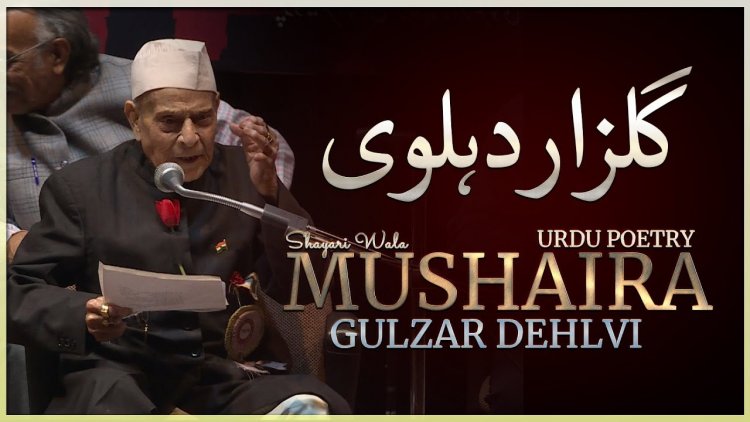The Melody of Pandit Gulzar Dehlvi

Veteran Urdu poet Anand Mohan Zutshi Gulzar Dehlvi passed away on 12th June, less than a week after recovering from the novel coronavirus. He was 93.
Earlier this month, Dehlvi tested positive for novel coronavirus. After a few days in the Covid-19 ICU at Greater Noida’s Sharda hospital, he returned home after recovering from the virus.
His son Anoop Zutshi told: “His corona test came negative on June 7 and we brought him home. Today he had lunch and at around 2.30pm, and after that he passed away. He was quite old, and the infection had left him very weak. So doctors are thinking it was possible a cardiac arrest.”
An ardent lover of the Urdu language, Dehlvi has been a part of a number of mushairas including Jashn-e-Rekhta in 2015 and Jigar Fest in 2018. He has also played a huge role in establishing many Urdu schools across India. He was known to be a follower of India's ganga-jamani tehzeeb (a term used to define a syncretic Hindu-Muslim culture) and always stood for secularism.
His journey throughout the years:
Born in old Delhi's Gali Kashmeerian in 1926 to Allama Tirbhoon Nath Zutshi “Zar” Dehlavi and Brij Rani Zutshi “Bezar” Dehlavi- both Urdu poets. Sitaram market in Old Delhi is named after one of his ancestors, he says. Apart from passing his MA exam from Hindu College, he also cleared the Adeeb Fazil and Munshi Fazil examinations (equivalent to high school and BA degree respectively across all Urdu boards) of Anjuman Taraqqi Urdu Hind in New Delhi.
A Kashmiri Pandit, Dehlvi spent his life working for Urdu and enriching it with his poetry. He was known for his multicultural identity, just like Delhi- where languages and traditions from all over the country just merges into each-other seamlessly.
Gulzar Dehlvi was also the editor of ‘Science ki Duniya’, the first Urdu science magazine published by Government of India in 1975. Dehlvi was an alumnus of Ramjas and BVJ Sanskrit School. Later, he did his Masters in Arts from Delhi's Hindu College and he retired from the Council of Scientific & Industrial Research around the early 1990s.
His involvement in freedom struggle:
Dehlvi’s association with the freedom movement began early — when he was in Class IV, he says. In 1933, King George V and Queen Mary of England were celebrating their 10th wedding anniversary. In Delhi, engraved brass plates were being distributed, along with four annas to schoolkids to have chaat and pakaudas at Chandni Chowk. “I rounded up students of various government-run schools, and we boycotted the celebration. That is how Aruna Asaf Ali noticed me, and my association with the Congress began,” he says. “Most of the nationalist poetry during the freedom movement, such as those by Bhagat Singh, was written in Urdu, a language some today seek to discredit as un-Indian,” he says.
During the freedom movement and after independence, Dehlvi was a regular at Congress meetings and rallies, as a premier Inquilabi poet. In 1951, prime minister Jawaharlal Nehru sent him to USSR for an international conference, and he was selected as the second world youth laureate.
After independence, Nehru and Maulana Azad (then education minister) would speak of inculcating scientific temper in their public speeches. I asked, “Maulana, how will this temper be developed if people don’t get scientific literature in their own language?”
Later he was appointed as the first editor of Science ki Dunia, India’s first popular science magazine in Urdu.
But did the victory come that easy?
He had to fight for 12 long years against government for this magazine until the government relented in 1970, and the first Urdu Science magazine was published in 1975. He served the magazine from 1975-89 as an editor. He said that “It was very hard time to me when everyone was suspicious about Urdu, and the government machinery didn’t cooperate with me. For others it is a service or career but for me it is my mission.”
Every year since inception from 1975 to 1985, Science ki Dunia organized a programme to celebrate Annual Science Day and this function was attended by the nation’s eminent scientists, educational, social and political personalities but the bureaucrats did not cooperate. This didn’t deter him and he continued to work with full devotion leaving no stone unturned for making conducive atmosphere for Urdu. He said:
“The activities against Urdu didn’t make me weak.”
His fight with Communalism:
His other mission was to fight communalism. Was he equally optimistic there?
Dehlvi said: “I have seen and known Delhi under various rulers. My ancestors were called here from Kashmir by Shah Jahan. Today, a small gang of men are trying to define what the country is. India is like an elephant, too vast for those with a narrow vision to comprehend. People get hold of a leg, or the tail, and feel they have the whole of India in their hands. But, for all their efforts to demonise Mulsims, the BJP and RSS haven’t even been able to secure the support of all Hindus, let alone Sikhs or Jains.”
But, he was quite particular about keeping his distance from the government. “Invitations still come for government events, but I don’t wish to participate in any function hosted by a communal government,” says Dehlvi.
He was however open to discussions on India’s past with them. “I can’t work with them. I will be glad if, instead of harassing Muslims on the street, they come to me. I will give them history lessons- how the Vedas talk of rishis eating meat, how the first freedom fighters, long before the Congress was born, were Muslims.”
Unchecked communalism can leave lasting scars on India, he warns. “I am a post-holder in the oldest Ramlila committee of Delhi, and of the Hazrat Nizamuddin dargah. I observe Holi, Diwali, Janmashtami, Shivratri, and all three Eids. This is what India is, and this is the only way it can survive. Giving in to communal rhetoric will end up fragmenting India, just as the British had once fragmented it.”
On his 91st birthday, Pandit Anand Mohan Zutshi Gulzar Dehlvi was felicitated by vice-president of India Hamid Ansari at Sector 26 community hall. The event, which was organized by various NGOs and residents’ welfare association of Sector 26 at the community hall, saw personalities like MLA Vimla Batham and UP minster Kailash Yadav.
Gulzar Dehlvi recited his work. He said that his affection towards poetry is dates back to last four generations of his family. “The new generation’s ignorant behaviour towards Urdu hurts me. It is the only language that connects two religions and countries. There is an urgent need to revive Urdu language for its long existence,” he said.
On speaking about his love for Urdu, he does not care about anyone. For him, Urdu is not a mere language; it is a messenger of peace, love and affection depicting the true culture of India. “It is our language, our forefathers always used Urdu. How can I treat Urdu badly.” And then he adds:
“There have been politics and conspiracies to destroy Urdu.”
A language so loved and respected unfortunately with time became synonyms with only the Muslim culture. Eventually, the language got communalized and now is falsely labelled as foreign. With the advent of globalisation, many Urdu speakers shifted towards English education.
With the demise of this great Urdu poet, may we honour him and his art form by re-introducing this beautiful language in our culture without any prejudice and let it have it’s gradual influence on us, just like Gulzar Dehlvi and his poetry did:
“us sitamgar kī mehrbānī se
dil ulajhtā hai zindagānī se
ḳhaak se kitnī sūrateñ ubhrīñ
dhul ga.e naqsh kitne paanī se
ham se pūchho to zulm behtar hai
in hasīnoñ kī mehrbānī se”
#RIP Pandit Gulzar Dehlvi!















































